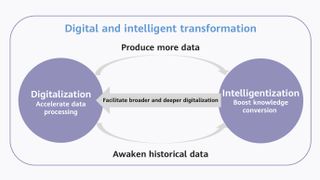As global industries rapidly shift gears from digitalization to digital-intelligent transformation, data storage emerges as the critical driver of this evolution.
Data is now a fundamental asset driving innovation. As such, effectively storing, managing, and utilizing this resource is crucial for any organization aiming to stay ahead. As industries across the globe accelerate their shift from digitalization to intelligent transformation, data has become the fifth factor of production.
In response to these trends, Huawei released a whitepaper Striding Towards the Intelligent World 2024 — Data Storage. According to the whitepaper, digitalization leverages general-purpose computing power, while intelligentization employs AI computing power to process and analyze data, creating value. Ultimately, data serves as the vital link between digitalization and intelligentization, laying the foundation for their convergence and a successful digital and intelligent transformation.

Figure: Data powers the convergence of digitalization and intelligentization. (Image credit: Huawei)
This places data in high regard, positioning it alongside traditional resources such as land and labor.
The Huawei whitepaper delves into the evolving landscape of data storage, presenting a compelling case for why businesses must rethink their data strategies to thrive in the digital-intelligent era. Further, the report offers strategic insights and actionable recommendations for building robust data infrastructures that can support the complex demands of modern AI applications and drive sustainable growth.
Whether through innovative all-flash storage solutions or AI-ready data architectures, Huawei is leading the charge when it comes to equipping organizations with the tools they need to navigate the future of data-driven innovation.
Digital and digital-intelligent transformation reshapes industries
Digital and intelligent transformation is reshaping key industries such as finance, healthcare, and manufacturing. These sectors, Huawei highlights, are experiencing a seismic shift as they integrate AI and data-driven technologies into their core operations, fundamentally changing how they operate and deliver value to their customers.
In the finance industry, for example, the integration of AI is revolutionizing everything from customer service to risk management. Banks are leveraging AI to provide personalized financial services, automate routine processes, and enhance fraud detection. This shift is not just about efficiency; it is about creating new, intelligent services that anticipate and respond to customer needs in real-time. The ability to process and analyze vast amounts of data quickly and accurately is critical for these advancements, making robust data storage and management systems essential.
Healthcare, too, is undergoing a profound transformation. AI is enabling more accurate diagnoses, personalized treatment plans, and efficient management of patient data. However, these advancements come with their own set of challenges, particularly in terms of data security and resilience. The white paper highlights the need for healthcare providers to implement comprehensive data resilience systems that protect sensitive patient information while ensuring that data is available and usable when needed. This is particularly important in an industry where timely access to accurate information can be a matter of life and death.
Manufacturing is another sector where digital and intelligent transformation is making a significant impact. AI-powered systems are being used to optimize production processes, predict maintenance needs, and improve product quality.
By analyzing data from various stages of the production process, manufacturers can identify inefficiencies and make real-time adjustments to improve performance. The use of AI in manufacturing not only boosts productivity but also enables the creation of smarter, more adaptive manufacturing systems that can respond to changing market demands with greater agility.
Highlighting the evolution of data storage and Huawei’s actionable recommendations for industry leaders
As industries shift gears from digitalization to intelligent transformation, Huawei's white paper, Striding Towards the Intelligent World 2024—Data Storage, underscores the crucial role of data storage in this evolution. According to the paper, “data is the fifth factor of production,” and how it is generated, stored, and utilized will determine a company’s ability to innovate and stay competitive.
Huawei outlines five key takeaways that are central to this transformation:
1.AI-ready data infrastructure: To support large AI models, Huawei advocates for a decoupled storage-compute architecture. This allows for independent scaling of computing and storage power, enabling businesses to manage growing data demands with greater flexibility. “Collaborative evolution and on-demand expansion of computing and storage power are essential for deploying AI-ready infrastructure,” Huawei explains.
2.All-flash storage: Huawei emphasizes the importance of all-flash storage, which boosts data processing efficiency and addresses the challenges posed by large model training. With high performance, capacity, and low power consumption, all-flash storage significantly improves system performance, making it an essential solution for industries undergoing digital and intelligent transformation.
3.Data resilience: In the face of rising cyber threats like ransomware, the white paper highlights the need for resilient data systems. These systems must not only defend against attacks but also enable fast recovery, ensuring business continuity. Huawei promotes the adoption of advanced protection strategies such as all-flash backup and multi-layer ransomware protection.
4.AI data lake foundation: Huawei encourages the development of unified AI data lakes, which help eliminate data silos and enable the free movement and use of multi-source heterogeneous data. This centralized platform is crucial for facilitating collaboration and improving AI training and inference capabilities across industries.
5.AI appliances: To simplify and accelerate the deployment of large AI models, Huawei recommends using pre-integrated AI appliances. These appliances come with the necessary infrastructure and tools for fast deployment, reducing complexity and speeding up intelligent transformation across diverse sectors.

 Reprint
Reprint